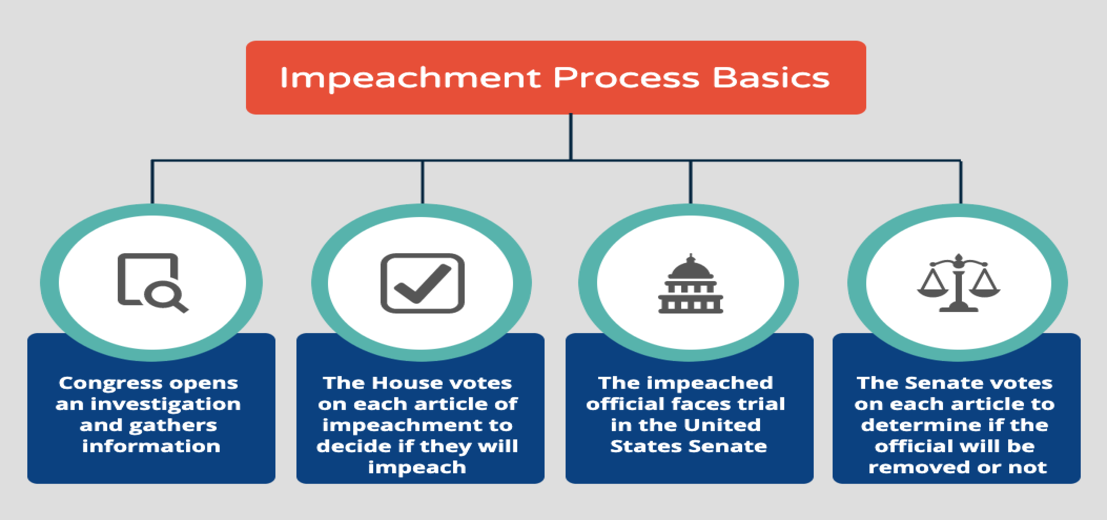
Prior to the current Donald Trump impeachment process, in the 243 year history of America, the impeachment process had only been invoked 3 times. The Trump impeachment process marks the 4th time and highlights the need for 3 changes that would improve the impeachment process.

Unfortunately there are some Republican Senators who are unable to be true unbiased jurors for an impeachment trial
Article 2 section 4 of the American Constitution states: The President, Vice President and all civil Officers of the United States, shall be removed from Office on Impeachment for, and Conviction of, Treason, Bribery, or other high Crimes and Misdemeanors. The definition of treason and bribery is clear, the definition of other high crimes and misdemeanors is not.
America’s founding fathers purposely left the definition of “high crimes and misdemeanors” vague and subject to Congresses’ interpretation. This allows a President who is doing immediate harm to the Constitution, the American government, or American society to be removed without waiting for the next election. But our founding fathers never intended the impeachment process to be a voter recall of the President, their intent was to keep the impeachment process fair and free of partisan politics.
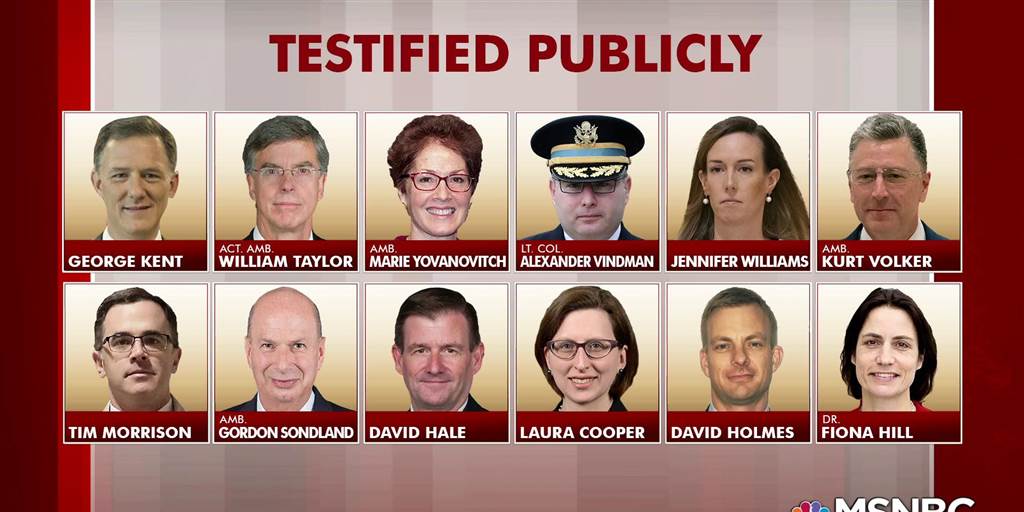
These are 12 loyal Americans who obeyed the American Constitution by cooperating with Congresses’ subpoena to testify at impeachment hearings. They defied President Trump’s illegal partisan political order not to cooperate with legal impeachment hearings
The founding fathers limited grounds for impeachment in order to safeguard another constitutional principle, the Separation of Powers. They realized the power to remove is the power to control. If Congress and the Senate can impeach and remove the President for any reason at all, then the President serves at the will of Congress and the Senate and is subject to their control. For instance, an early draft of the Constitution gave Congress the power to impeach and remove the president for “maladministration.” Founding father James Madison objected to this because the term was so vague that it would allow impeachment for any reason at all. As he put it, “so vague a term will be equivalent to a tenure during the pleasure of the Senate.”

A special impeachment court could make sure that partisan politics in the impeachment process by any political party is prevented
Now in 2019, the Trump impeachment process has highlighted how partisan politics could undermine the founding fathers’ vision for impeachment. 3 changes would prevent partisan politics from infecting the purity of any future impeachment process:
Establish Special Impeachment Court
Once the House starts the impeachment process of a president it should begin with the establishment of a temporary special impeachment court, similar to the United States Foreign Intelligence Surveillance Court (FISA), its sole function would be to rule immediately on all matters related to the impeachment process. Currently, there are 2 cases in the regular U.S. courts whose outcomes have a direct impact on the Trump impeachment process, but those outcomes will take months to play out in the courts. A special impeachment court could rule immediately and would have the equivalent enforcement authority as the U.S. Supreme Court.
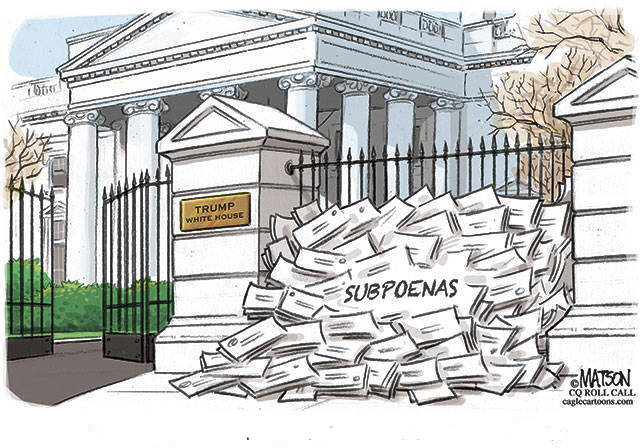
President Trump has been able to avoid complying with impeachment subpoenas from Congress by opposing them in U.S. courts which takes months to reach a verdict. A special impeachment court could reach a verdict immediately on the validity of the subpoenas
A special impeachment court is not only needed for quick legal decisions, but also as a neutral arbiter on decisions related to rules of how an impeachment trial would be conducted. Because in Nixon v. United States, the U.S. Supreme Court ruled that rules of a Senate impeachment trial were political actions that could not legally be changed by the U.S. Court system. Questions about who testifies at an impeachment trial should be answered by a special impeachment court not by politicians holding the majority in the Senate. A president shouldn’t be able to deny Congress the documents they need access too and delay the impeachment process, by opposing congressional impeachment subpoenas for documents in regular U.S. courts for months, a special impeachment court issuing immediate rulings would prevent this.
Lock Up No-Shows
Once the House has begun the presidential impeachment process, no American citizen, government employee or not, should be able to ignore or defy a congressional subpoena to appear in person at any impeachment proceeding. Anyone who does not appear when subpoenaed should be immediately locked up in jail.
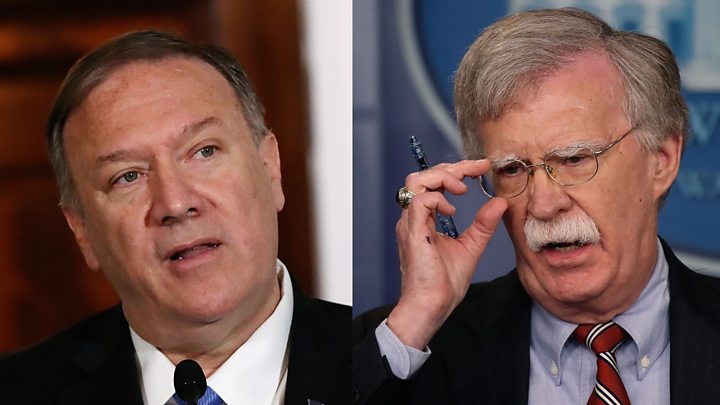
Secretary of State Mike Pompeo (left) and former National Security Adviser John Bolton (right) both have important impeachment information to share with Congress but refuse to appear at impeachment hearings, a special impeachment court could force them to appear
Chief Justice Should Set The Rules Of Senate Trial
The rules for the impeachment trial of a President should no longer be set by the political party holding the majority in the Senate. The U.S. Constitution dictates that the Chief Justice of the Supreme Court preside over the trial, a rule change should also allow the Chief Justice to establish the rules of the Senate trial. This would prevent partisan political abuse of the impeachment trial. Any questions about the Chief Justice’s rules can be resolved by the special impeachment court.
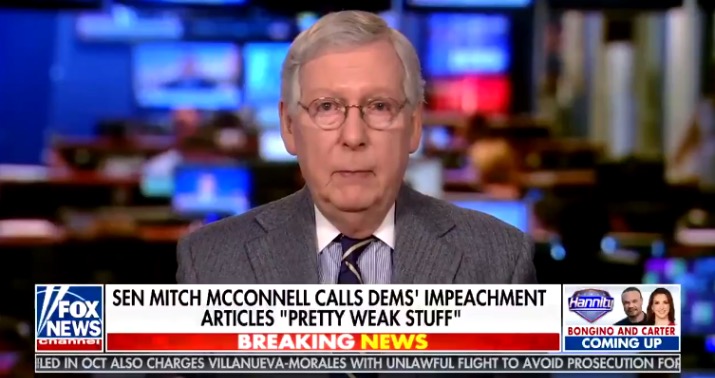
Senate Majority Leader Mitch McConnell announced on Fox News that he will coordinate with President Trump’s lawyers to make the rules for the Senate impeachment trial, a violation of the oath all Senators are required to take before participating in an impeachment trial. Partisan politics like this is why the Chief Justice of the U.S. Supreme Court should set the rules of any Senate impeachment trail of a president
The founding fathers and the Constitution set a HIGH bar for the removal of a President from office. The high bar is meant to prevent partisan politics from playing a decisive role in the impeachment process. Making these 3 impeachment process changes will insure that partisan politics don’t play a decisive role in the impeachment process for the next 243 years.


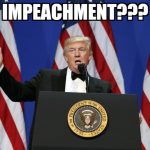

Leave a Reply